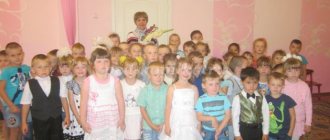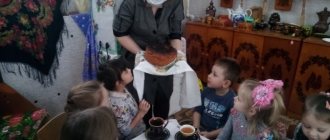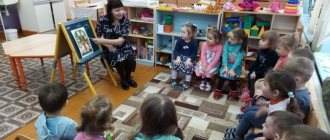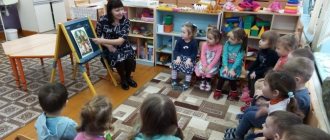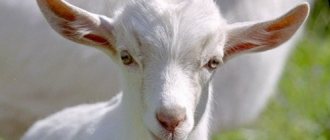Presentation “The system of civic-patriotic education in preschool educational institutions”
#Publications #Article #Social teacher #Methodologist #Educator #Psychologist #Music director #Preschool education
Municipal budgetary preschool educational institution "Kindergarten No. 73 "KID" of the city of Smolensk SYSTEM OF CIVIC-PATRIOTIC EDUCATION IN MBDOU "KINDERGARTEN No. 73 "KID" (from work experience) Senior teacher Oksana Anatolyevna Vasilyeva
“Cultivating love for the native land, for the native culture, for the native city, for the native speech is a task of paramount importance, and there is no need to prove it. But how to cultivate this love? It starts small - with love for your family, for your home. Constantly expanding, this love for one’s native turns into love for one’s state, for its history, its past and present, and then for all of humanity.” D.S. Likhachev
The problem of civic and patriotic education of the younger generation has always occupied a worthy place in the history of domestic pedagogy. V.A Sukhomlinsky, A.S. Makarenko et al. in their works emphasized the need to instill civic and patriotic feelings in children, starting from preschool age. In this regard, the problem of civic and patriotic education of preschool children becomes one of the most pressing. This feeling does not arise in people on its own. This is the result of long, focused education. Recently, the term “new patriotism” has appeared. It includes a sense of responsibility to society, a sense of attachment to family, home, homeland, native nature, and a tolerant attitude towards other people. The formation of a child’s personality, his upbringing begins with the education of feelings through the world of positive emotions, through mandatory familiarization with culture, providing the spiritual and intellectual food that he so needs.
In our kindergarten, when organizing the civic and patriotic education of children, the following goals are set: nurturing in the child love and affection for his family, home, kindergarten, street, city; formation of a caring attitude towards nature and all living things; developing interest in Russian traditions and crafts; formation of basic knowledge about human rights; expanding ideas about Russian cities; introducing children to the symbols of the state (coat of arms, flag, anthem); developing a sense of responsibility and pride for the country’s achievements; the formation of tolerance, a sense of respect for other peoples and their traditions. These goals are achieved in all types of children's activities.
Civic and patriotic education of preschool children CHILD FAMILY KINDERGARTEN HOMETOWN HOMELAND COUNTRY
Civic-patriotic education of children includes 5 blocks: Me and my family. A child's world begins with his family. Children gain knowledge about their immediate environment, family, they develop a humane attitude towards their loved ones, and their ideas about the activities of loved ones, family stories, and traditions are clarified.
Civil-patriotic education of children includes 5 blocks: Kindergarten In the junior and middle groups, through games, excursions, walks, and activities, we learn how to navigate the premises of the kindergarten, say hello to teachers and children, say goodbye, take care of toys and books, and maintain order. in Group. In the senior and preparatory groups for school, we teach them to freely navigate the territory and premises of the kindergarten, and introduce them to the events that are held in the kindergarten. We teach how to follow traffic rules and safety precautions, how to dial emergency numbers, how to be attentive to peers and how to take care of younger children. We foster a caring attitude towards children's play structures.
Civil-patriotic education of children includes 5 blocks: Native nature Love of nature is one of the manifestations of patriotism. It is important to instill in children the ability to aesthetically perceive the beauty of the world around them, to treat nature poetically, emotionally, carefully, and to encourage children’s desire to learn more about their native nature.
Civic-patriotic education of children includes 5 blocks: Hometown. Home country Children receive local history information about their hometown, the history of its origin, its attractions, institutions, and famous fellow countrymen. From this block, children receive geographical information about the territory of our country (globe, map). In the middle group, they get acquainted with the state symbols of Russia: coat of arms, flag, anthem. In the senior group, they expand their understanding of the meaning of state symbols of Russia, develop a respectful attitude towards them, get acquainted with the capital of our state, other cities of Russia, and famous Russians. Children develop the idea that Russia is a multinational country with distinctive, equal cultures. The foundations of civil-patriotic feelings are also formed: love, pride and respect for one’s country, its culture, awareness of personal involvement in Russia.
Civil-patriotic education of children includes 5 blocks: Native culture It is very important to instill in children a sense of love and respect for the cultural values and traditions of the Russian people. In the classes of this block, we introduce children to oral folk art: fairy tales, holidays, folk arts and crafts. Trying to form in children a general idea of folk culture, its richness and beauty, we regularly organize excursions to our mini-museum, where students get acquainted with history and objects of Russian everyday life. We participate in folk festivals.
Civic and patriotic education of preschool children LEISURE ACTIVITIES, holding patriotic holidays SPORTS HOLIDAYS classes LEISURE EXHIBITIONS OF CHILDREN'S WORK THEATRALIZED PERFORMANCES PARTICIPATION IN COMPETITIONS EXCURSIONS CHILDREN'S PROJECTS Forms of work
In addition to specially organized classes, conversations, and targeted walks, a large role in the implementation of these blocks is given to the joint activities of adults and children. Didactic, mobile, board, role-playing games with children are used, which help to form relevant knowledge and skills. The greatest emotional response in children is caused by holidays, matinees, and mass events that promote the development of patriotic feelings: Themed leisure for Mother's Day New Year's matinee Day of Defenders of the Fatherland Maslenitsa Victory Day Children's Day Competitions, quizzes, competitions
To achieve our goals, we organize work on patriotic education, creating a warm, cozy atmosphere for children, trying to ensure that every day of a child in kindergarten is filled with joy, smiles, good friends, and fun games. After all, with the cultivation of a feeling of attachment to one’s own family, one’s own kindergarten, one’s own street, the formation of the foundation begins on which a more complex education will grow - a feeling of love for one’s Fatherland.
In our preschool educational institution, along with the Main educational program of preschool education, partial programs of the so-called regional component are being implemented: “My Land of Smolensk” edited by T.M. Zharova, V.A. Kravchuk. "Young Ecologist" ed. S.N. Nikolaeva “Introducing children to the origins of Russian folk culture” by O.L. Knyazeva, M.D. Makhaneva;
The program pays special attention to the possibility of implementing the principle of introducing children to sociocultural norms, traditions of the family, society and state. The immediate environment, the social environment in which children live, is the basis for expanding children's horizons and for introducing children to sociocultural norms, traditions of the family, society, and state. First, the teacher thinks through how and through what it is possible to show children the connection between their hometown and family with the whole country, to emphasize what will contribute to the ethnocultural social situation of children’s development: features of nature; people who glorified their region through their work, achievements in art, and sports; people who have gained fame not only in the region, but also in the country and beyond. What is demonstrated is what exists in our native region, but is also typical for the whole country: nature conservation; people's labor; observance of traditions associated with the celebration of significant dates; residence of people of different nationalities.
Based on all of the above, based on the principles of constructing an educational educational program for preschool education and in accordance with the Federal State Educational Standard for Preschool Education, we developed the project “Civic and Patriotic Education in the Conditions of a Modern Preschool Educational Institution.” The project was created to work with preschool children and is a series of activities for the joint activities of teachers with children on civic and patriotic education in order to develop and create conditions for the formation of civic and patriotic feelings of preschoolers through appealing to the memory of the historical past of our state, involving parents and teachers in instilling in children a sense of pride in the achievements of their native country, interest and respect for its historical past, respect for the traditions of its people.
Relevance of the project Modern children have insufficient information about their hometown, country, features of folk traditions, are often indifferent to loved ones, to group mates, and rarely sympathize with the grief of others. Teachers need to select methods and techniques that will help a modern child understand the special significance of their country, its heroes, historical figures, and architecture. An important role in the work on civic-patriotic education is given to the interaction of preschool educational institutions with parents.
The goals of the project are to educate a citizen and patriot of one’s country, to form moral values; creation of a subject-development environment in the preschool educational institution for the implementation of the project. Project hypothesis Patriotic education should be comprehensive, permeate all types of activities of a preschooler, carried out both in everyday life and during direct educational activities to understand the surrounding world.
Objectives of the project To educate in children: To develop in children: To form in children: The desire to learn cultural traditions through creative, educational and research activities The desire to feel and realize oneself as part of a large ethnic group Respect for the heritage of other peoples Patriotism, respect for the cultural past of Russia, one’s city Civil-patriotic feelings through the study of the state symbols of Russia and the city Cognitive processes and mental operations through special games and exercises Ideas about folk culture, the diversity and lifestyle of the people inhabiting Russia Feelings of love for the native land, one’s small homeland based on familiarization with native nature , culture and traditions The idea of Russia as a native country The ability to analyze various social phenomena and events, compare them, generalize
Operating principles: the principle of person-oriented communication; the principle of cultural conformity; the principle of freedom and independence; the principle of humane and creative orientation; the principle of integration of various types of children's activities;
Stages of project implementation Stages Project implementation period Work plan I 2016 – 2022 academic year year Informational and analytical (preparatory) increase in the level of professional competence of teachers; determining the volume of material for children; work system planning. II 2022 – 2022 academic year year Creative (main) design of stands on the topic of the project; consultations for educators and parents; holding events on the topic of the project. III 2022 – 2019 academic year year Final summing up.
Information-analytical (preparatory) stage Analysis of the goals and objectives of the main general education program of preschool education; Carrying out and interpreting the results of psychological and pedagogical diagnostics; Determination of directions for project implementation; Determining the expected results of the project; Inclusion in the calendar-thematic planning of the week's themes on civic-patriotic education: “My home, my city, my country, my planet”, “The world of nature”, “City of craftsmen”, “Folk culture and traditions”, “Week of Belarus”, “Victory Day”, “I am a man”, “My family”, “Friendship”, “Kindness rules the world”, etc.
The creative stage involves the joint activity of participants in the educational process, the development of civic and patriotic feelings, the ability for creative and search activities, taking into account the characteristics of the child’s development and the socio-pedagogical conditions of organizing the educational environment in preschool educational institutions and families. At this stage, work was carried out in several directions: - attracting children to actively participate in leisure activities (holidays, entertainment, concerts, theme evenings, children's creativity competitions, reading competitions); in design and research activities (development of children's and adult projects); — working with parents to involve them in joint creative, design and research activities based on the use of various forms and means of patriotic education of children; — work with society to implement the tasks of patriotic education: secondary school, children's library. — monitoring the progress of design and search work on collecting, processing and presenting (presentation) the results of the implementation of thematic projects
Creative (main) stage Stand design
During the implementation of the creative stage of the project, the following was created: a system of direct educational activities for the civic and patriotic education of preschoolers in the process of developing project activities; data bank on assessing the quality of civic and patriotic development of children in preschool educational institutions. photo and video library to improve the competence of educators and parents in the field of civic and patriotic education of preschool children; methodological recommendations have been developed for interaction with families in the field of patriotic education of preschool children; enriched the developing subject-spatial environment of preschool educational institutions for the civic and patriotic development of children;
According to the results of the final diagnostics, the children showed high results in the field of civic and patriotic education. Children know: their home address; parents' place of work; place of residence (street, city, country); nationality, language, traditions; have an idea of the diversity of peoples inhabiting our homeland; the name of the planet we live on; nature of native places, flora and fauna. At the final stage, the results of a lot of work on the civic and patriotic education of preschoolers will be summed up, methodological material will be collected and summarized
Prospects for further development of the project Gradually, thanks to systematic, purposeful work, preschoolers become familiar with what will help them become responsible people, with an active life position, who feel involved in their native land, its history, traditions, respect the Fatherland, the achievements of their people, who love their family, ready to perform their civic duties. The work of instilling patriotic feelings in preschool children does not end here; it will continue. I would like to sum it up with the words of Vasily Aleksandrovich Sukhomlinsky: “Just like a small tree that barely rises above the ground, a caring gardener strengthens the root, on the power of which the life of the plant depends for several decades, so a teacher should take care of instilling in his children a feeling of boundless love for the Motherland.” .
I would like to believe that the work carried out in our kindergarten on the civic-patriotic education of preschoolers will be the foundation for educating the future generation with spiritual and moral values, civil-patriotic feelings, respecting the cultural, historical past and present of Russia. We are also actively interested in the history and culture of not only our Motherland, but also our close, good neighbors - the Republic of Belarus. We have common borders, we understand each other without an interpreter. There is a lot in common in the history, culture, and traditions of our peoples. We learn ourselves and teach our children to take care of all this wealth. And not only protect it, but also multiply it. Such responsible work awaits our children in the near future! In the meantime, our task is to accumulate knowledge and enrich the soul with kindness.
THANK YOU FOR ATTENTION!
“Formation of moral and patriotic education in children through project activities”
Modern children know little about the cultural traditions of their people, often show indifference to loved ones and peers, and children have a lack of moral and patriotic qualities. Therefore, the topic of moral and patriotic education of children is one of the main tasks of our kindergarten, which we have been working on for several years.
Having studied a variety of working methods, we came to the conclusion that the introduction of project activities in work with preschoolers is one of the bright, educational, interesting, and significant methods for both adults and children.
We began work on introducing the project-based teaching method into kindergarten practice 3 years ago. We have implemented the following projects: “Our beloved city of Kamyshin”, “The Earth is our home”, “Genealogy of my family”, “Studying family history. Family Album”, “Genealogical Tree of Our Family”, “Kamyshin Mountains Ears”, “Russian Izba”. Project activity is an effective means for implementing the tasks of moral and patriotic education of preschool children, promotes the development of one’s own cognitive activity, creativity, thinking, imagination, fantasy, and communication skills; stimulates the development of independence and responsibility.
In the 2016-2017 academic year, our kindergarten hosted a vibrant, multi-scale project “Sights of the City of Kamyshin.”
We determined the relevance of the project: if we want our children to love their country, we need to do a lot to make them love the place where they were born and live.
We set ourselves a problem.
Children do not think about the fact that the city in which they live is their small homeland. They don’t know anything about its history or attractions. Without sufficient knowledge, it is difficult to form a respectful attitude towards the small Motherland. Such a large project was divided into blocks. Teachers were given the opportunity to determine the topics of projects and their duration in accordance with the age characteristics of the children. Each age group worked on their own project:
- “Monument to Dmitry Thessalonica”;
- "Embankment. Historical and Local Lore Museum of Kamyshin";
- "Borodinsky Bridge";
- "Avenue of Heroes";
- Monument to "A.P. Maresyev";
- "Open-air museum of military equipment."
Objective of the project:
To form primary ideas of preschool children about their hometown .
Tasks identified:
- Studying the level of competence and awareness of preschool teachers on the issue of “Moral and patriotic education of preschool children through the organization of project activities.”
- Creating conditions for increasing the level of competence of teachers on the topic “Moral and patriotic education of preschool children through the organization of project activities.”
- Development of methodological materials on the topic: “Moral and patriotic education of preschool children through the organization of project activities.”
- Creation of a full-fledged subject-development environment.
- Implementation of projects on moral and patriotic education of preschool children.
Work to implement the assigned tasks took place in several stages.
Stage I. Diagnostic
At the 1st stage, the state of the educational process was monitored, and the knowledge of teachers on this issue was also identified. Summarized the results of the monitoring:
- Lack of competence and awareness of teachers in this area.
- There is no interaction between specialists, parents and society on this issue.
- Insufficient material, technical and methodological equipment.
- Lack of development of materials for organizing project activities.
Based on the analysis of the data obtained, an action plan was drawn up to eliminate the contradictions that arose.
Stage II. Theoretical-organizational .
We conducted a theoretical and practical seminar “The project method as a form of organizing the educational process and the development of creative cognitive thinking,” and organized a number of consultations.
Stage III. Practical research of the problem.
- We developed a long-term work plan.
- We purchased visual demonstration materials and created game files.
- We established relationships with parents and other social institutions of the city.
We introduced parents to the plan for upcoming events in the kindergarten and talked about upcoming competitions and exhibitions. The purpose of this is to attract parents to this area in raising the younger generation and the direct participation of parents themselves in preschool activities.
Cognitive and familiarization period with the pupils - within its framework, activities were carried out: learning poems, songs on military themes, introduced children to works of art about the Motherland, about Moscow, about the defenders of the Fatherland, about the war, about Victory, and held conversations - “Defenders”, “We are proud of our fellow countrymen,” during which the children got acquainted with the heroes of the Great Patriotic War, the defenders of our Motherland today, with the branches of the military, their distinctive features, with military paraphernalia, equipment, etc. We conducted familiarization excursions to the monuments, in museums, to memorable places of our city. So we organized field trips to the A.P. Maresyev Museum, to the monument to A.P. Maresyev, visited the Alley of Heroes, the open-air museum of military equipment, the monument to Dmitry Solunsky, our Borodino Bridge, which connects the two banks of Kamyshin, on On Chestnut Alley we met our fellow countryman, singer Evgeny Martynov. The guys received a great treasure of knowledge and a sea of impressions.
Practical – creative stage. During the implementation of this stage, the children showed their creativity, emotional uplift, and interest. We held creative exhibitions of photographs, drawings, and collages on the theme of the project. The result of the design activity was a layout. Parents took an active part in creating the layouts. They enthusiastically got involved in the work and the results of this work are presented at the exhibition.
As a result of systematic work during the implementation of the project, children not only gained knowledge, but also expressed their feelings in productive activities, in composing creative stories. Every year at this stage of work in kindergarten there is a competition for the best group corner of “Moral and Patriotic Education”. The best exhibits were then presented at general thematic exhibitions, and some of the thematic conversations with children were also held here.
And now I want to dwell on the results of our work. We determined the level of success of preschoolers in moral and patriotic education over 5 years, using the diagnostic methodology of O. V. Sakavicienė (determining the level of knowledge of older preschoolers about the content of the concept of “patriotism”).
The results show that at the beginning of 2012 the success rate was 53-54%, but for the period of April 2022 it has increased significantly and reaches almost 90%.
The result of our work is that children have enriched knowledge about the history and culture of their native land. Children have become open in expressing their feelings: they talk about their love for the city, show respect for veterans and working people, show a desire to learn the history of their native land, and curiosity. Children have developed the ability to compare and contrast events and phenomena, a distinction between old and new has appeared, the ability to perceive specific historical events, and cognitive interest has increased.
The result of the work was also positive changes in the attitude of parents to the problem of patriotic education. Parents have developed an active position and a sense of responsibility for the spiritual and moral development of their children.
This work contributed to the creation of a creative atmosphere not only in the children's team and in each family, but also in the general team of parents and teachers. The merging of group projects into a single garden-wide project allows us to ensure age continuity and track the complication of content from group to group.
The work on implementing projects organically fit into the pedagogical process of the kindergarten. Subsequently, the use of the project activity method captured teachers so much that they began to use it in solving other problems.
